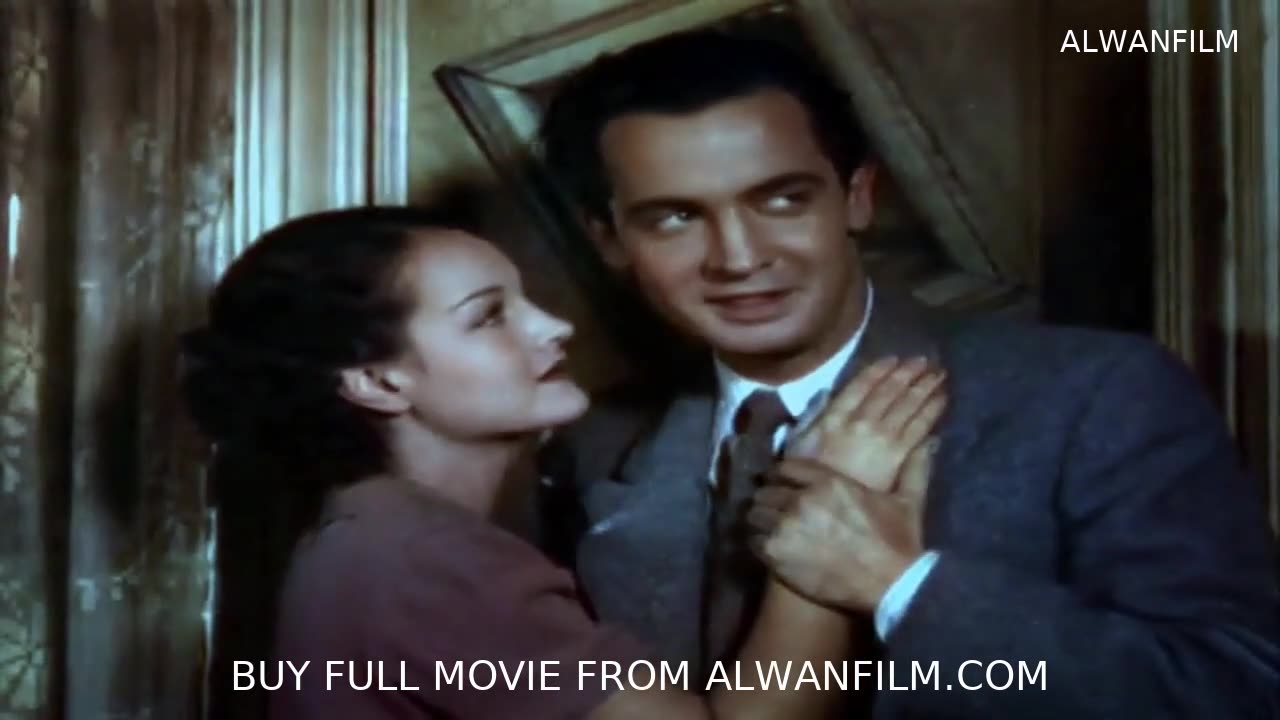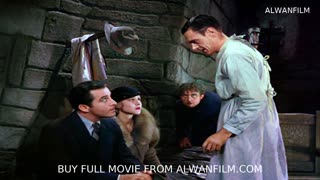Premium Only Content

Show Them No Mercy Colorized
Show Them No Mercy Colorized
Introduction
In the annals of film history, there are many hidden gems that, while not as widely celebrated as their contemporaries, have left an indelible mark on the art of cinema. One such film is "Show Them No Mercy!" (1935). Directed by George Marshall, this gripping crime drama, set against the backdrop of the Great Depression, offers a raw and unflinching look at desperation and moral ambiguity. In this article, we delve into the intricacies of "Show Them No Mercy!" and its significance in the cinematic landscape of the 1930s, exploring the performances, storyline, and the broader themes that make this film a noteworthy piece of film history.
Check The Full Colorized Movies List
Check Our YouTube Channel
Check Our Colorized Movies Trailer Channel
Understanding Show Them No Mercy 1935 Colorized: Director, Cast, and Genre
"Show Them No Mercy!" is helmed by George Marshall, a versatile director known for his work across various genres, from westerns to comedies. In this film, he adeptly navigates the crime drama genre, delivering a taut and suspenseful narrative. The cast includes a blend of rising stars and seasoned actors, with Rochelle Hudson, Cesar Romero, and Bruce Cabot delivering compelling performances that bring the film's tense storyline to life.
Marshall's direction is characterized by its meticulous attention to detail and its ability to evoke strong emotional responses from the audience. His use of lighting, shadow, and camera angles creates an atmosphere of tension and unease, perfectly complementing the film's dark themes.
Exploring the World of Show Them No Mercy 1935 Colorized: Plot and Characters
"Show Them No Mercy!" tells the harrowing story of a young couple, Joe and Loretta Martin (played by Edward Norris and Rochelle Hudson), who, along with their baby, unwittingly become hostages in a rural hideout of a ruthless gang of kidnappers led by the menacing Tobey (Bruce Cabot). As the tension escalates, the couple must navigate their fear and desperation, trying to outwit their captors and protect their child.
The film's plot is a gripping blend of suspense, action, and psychological drama. Each character is intricately developed, with their motivations and moral dilemmas adding depth to the narrative. Joe and Loretta's struggle for survival against the brutal gang members highlights the human capacity for resilience and resourcefulness in the face of overwhelming adversity.
The Art of Crime Drama in the 1930s
The 1930s was a formative decade for the crime drama genre, with filmmakers experimenting with storytelling techniques and visual styles to captivate audiences. The Great Depression era, with its pervasive economic hardship and social unrest, provided a rich backdrop for tales of crime, corruption, and moral ambiguity.
"Show Them No Mercy!" stands out for its unflinching portrayal of the darker aspects of human nature. The film's gritty realism and intense emotional stakes set it apart from other crime dramas of its time. Its exploration of themes such as desperation, betrayal, and the struggle for survival resonated deeply with audiences during the 1930s, reflecting the harsh realities of the era.
Early Crime Films: A Brief History
Crime films have long been a staple of cinematic storytelling, evolving from the silent era's melodramatic depictions of criminal exploits to the more nuanced and psychologically complex narratives of the 1930s. Early crime films often depicted larger-than-life gangsters and lawmen, reflecting society's fascination with the criminal underworld.
The 1930s saw the rise of the gangster film, with iconic titles like "Little Caesar" (1931) and "The Public Enemy" (1931) setting the stage for a new era of crime cinema. These films combined thrilling action sequences with moral and ethical questions, challenging audiences to grapple with the complexities of right and wrong.
Show Them No Mercy 1935 Colorized and Its Significance
"Show Them No Mercy!" occupies a unique place within the crime drama genre, offering a more intimate and character-driven narrative compared to its contemporaries. The film's focus on the psychological and emotional toll of crime and violence sets it apart, providing a stark contrast to the more sensationalized portrayals of the era.
The film's release during the height of the Great Depression added to its impact, resonating with audiences who were themselves grappling with economic hardship and uncertainty. The story of a young couple's struggle to protect their family against ruthless criminals struck a chord, highlighting the themes of resilience, sacrifice, and the indomitable human spirit.
The Debate Over Crime Dramas and Their Social Impact
Crime dramas have long sparked debates about their influence on society, with critics arguing that they can glamorize criminal behavior and desensitize audiences to violence. However, proponents of the genre contend that crime dramas provide a valuable forum for exploring complex moral and ethical issues, offering insights into the human condition.
"Show Them No Mercy!" exemplifies this duality, presenting a narrative that is both thrilling and thought-provoking. The film's portrayal of the consequences of crime and violence serves as a stark reminder of the darker aspects of human nature, prompting viewers to reflect on their own values and beliefs.
Examining Show Them No Mercy 1935 Colorized as a Crime Drama
As a crime drama, "Show Them No Mercy!" excels in its ability to create tension and suspense while also delving into the psychological and emotional dimensions of its characters. The film's pacing, cinematography, and performances work in harmony to create a gripping and immersive viewing experience.
The characters' moral dilemmas and internal conflicts add depth to the narrative, elevating it beyond a simple tale of good versus evil. Joe and Loretta's struggle to protect their child and survive against the odds highlights the complexities of human nature, with moments of fear, courage, and desperation interwoven throughout the film.
Influence and Legacy: Show Them No Mercy 1935 Colorized's Impact on Cinema
While "Show Them No Mercy!" may not be as widely known as some of its contemporaries, its influence on the crime drama genre is undeniable. The film's emphasis on psychological depth and character development paved the way for future crime dramas, inspiring filmmakers to explore the darker and more nuanced aspects of human behavior.
The film's legacy can be seen in the works of directors such as Alfred Hitchcock, who similarly blended suspense, psychological complexity, and moral ambiguity in his films. "Show Them No Mercy!" serves as a testament to the enduring power of crime dramas to captivate and challenge audiences.
Director's Cinematic Legacy: Beyond Show Them No Mercy 1935 Colorized
George Marshall's directorial career spanned several decades and encompassed a wide range of genres, from westerns to comedies to crime dramas. His versatility and ability to craft compelling narratives made him a respected figure in Hollywood.
In addition to "Show Them No Mercy!," Marshall directed notable films such as "Destry Rides Again" (1939) and "The Blue Dahlia" (1946), each showcasing his skill in creating engaging and emotionally resonant stories. His work continues to be studied and appreciated by film scholars and enthusiasts, reflecting his lasting impact on the industry.
Themes Explored in Show Them No Mercy 1935 Colorized
"Show Them No Mercy!" delves into themes of desperation, survival, and moral ambiguity, painting a vivid portrait of human nature under extreme circumstances. The film's exploration of these themes resonates with audiences, offering a thought-provoking examination of the human condition.
Desperation is a central theme in the film, with Joe and Loretta's struggle to protect their child serving as a powerful metaphor for the lengths people will go to in order to survive. The film also explores the concept of moral ambiguity, with characters facing difficult choices and ethical dilemmas that challenge their values and beliefs.
Reception and Controversy Surrounding Show Them No Mercy 1935 Colorized
Upon its release, "Show Them No Mercy!" received mixed reviews from critics, with some praising its intense performances and gripping storyline, while others criticized its depiction of violence and moral ambiguity. Despite the controversy, the film found an audience among moviegoers, who were drawn to its raw and unflinching portrayal of crime and desperation.
The film's controversial themes and unflinching portrayal of violence sparked debates about its social impact, with some critics arguing that it glamorized criminal behavior. However, others defended the film, asserting that it provided a valuable commentary on the human condition and the harsh realities of the Great Depression.
Where to Watch Show Them No Mercy 1935 Colorized Online
For those eager to experience "Show Them No Mercy!" firsthand, the film is available on various streaming platforms and classic film archives. Its availability ensures that new generations of cinephiles can discover and appreciate this forgotten classic, experiencing its powerful storytelling and compelling performances.
FAQs About Show Them No Mercy 1935 Colorized
Q: Is "Show Them No Mercy!" based on a true story?
A: While the film is not directly based on a true story, it draws inspiration from the real-life crime and social issues of the Great Depression era. The characters and events are fictional, but they reflect the harsh realities and moral complexities of the time.
Q: What is the significance of the film's title?
A: The title "Show Them No Mercy!" reflects the ruthless and uncompromising nature of the film's antagonists, as well as the desperate struggle of the protagonists to survive. It serves as a stark reminder of the brutality and moral ambiguity that pervades the film's narrative.
Q: What are some notable performances in the film?
A: Rochelle Hudson and Edward Norris deliver standout performances as Loretta and Joe Martin, respectively, bringing depth and emotional resonance to their roles. Bruce Cabot's portrayal of the menacing Tobey is also noteworthy, adding a chilling intensity to the film.
Conclusion
In conclusion, "Show Them No Mercy!" (1935) is a powerful and compelling crime drama that offers a raw and unflinching look at the darker aspects of human nature. Directed by George Marshall and featuring strong performances from its cast, the film explores themes of desperation, survival, and moral ambiguity, resonating with audiences both in its time and today. Despite the controversy surrounding its depiction of violence and moral complexity, "Show Them No Mercy!" remains an important and influential work in the history of cinema, highlighting the enduring power of crime dramas to captivate and challenge viewers. As we continue to explore the rich tapestry of film history, it is essential to revisit and appreciate forgotten classics like "Show Them No Mercy!," recognizing their contributions to the art of storytelling and their impact on the cinematic landscape.
-
 1:00
1:00
AlwanFilm
2 days agoFrankenstein 1931 Colorized
31 -
 LIVE
LIVE
johnnymassacre
10 hours agoLet's Play Space Marine 2 | ANGEL OF DEATH MODE | Pt 3
157 watching -
 18:07
18:07
Bearing
3 hours agoThe INSANE MENTAL DECLINE of the Democrats 💥 Lefties are NOT Ok
6.28K25 -
 15:55
15:55
Clownfish TV
14 hours agoDisney and ABC Getting INVESTIGATED by the FCC Over DEI Policies?!
10.4K9 -
 0:47
0:47
Rethinking the Dollar
23 hours agoFrom $2K to $3K: Why Gold Is Skyrocketing
6.55K4 -
 8:21
8:21
Tundra Tactical
18 hours ago $1.00 earnedDOJ's Shocking Silencer Decision Explained?
10.3K5 -
 2:14:24
2:14:24
Badlands Media
1 day agoDevolution Power Hour Ep. 341: Narrative Cracks, Vaccine Backpedals & The Awakening of the Silent Majority
164K162 -
 37:55
37:55
Forrest Galante
12 hours agoPrivate Tour of The World's Best Backyard Reptile Zoo
49.7K15 -
 14:38
14:38
Exploring With Nug
1 day ago $32.36 earnedWe Found the Secret That This Lake Has Been Hiding For Decades!
107K12 -
 LIVE
LIVE
VladsGamingCartel
2 hours agoKCD 2 | Vlad Streams #BadAtGaming
27 watching